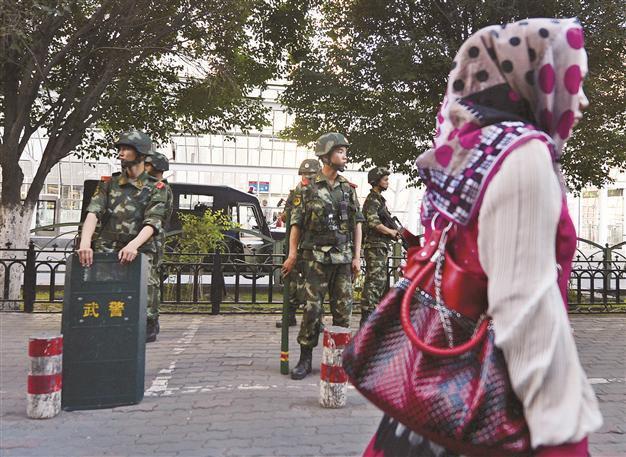Ankara concerned over Xinjiang unrest
ANKARA/ BEIJING

Chinese paramilitary police stand guard in the Muslim Uighur minority area of Urumqi after bloody clashes. AFP photo
Tension was high in China’s ethnically-divided region of Xinjiang after the deadliest unrest in years, leading Turkey to voice concerns.Chinese paramilitary troops have been ordered to conduct round-the-clock patrols following a series of clashes that have killed at least 56 people over the last months. The order issued June 29 comes days ahead of the July 5 anniversary of a 2009 riot in the regional capital Urumqi that left 200 people dead, most of them Han civilians. Areas where clashes have occurred have been sealed off and information about them has been tightly controlled.
Turkish Foreign Minister Ahmet Davutoğlu and his Chinese counterpart Wang Yi discussed the developments in Xinjiang on the sidelines of the Association of Southeast Asian Nations’ (ASEAN) meeting, held in Brunei. Davutoğlu noted that Xinjiang is a cultural bridge between two countries. Turkish Foreign Ministry also voiced Turkey’s concern over the unrest, saying they attributed importance to security, stability and peace of the region, which Turkey sees as a friendship bridge with China.
“Turkey believes that the Chinese government would enlighten the incidents and constitute stability and safety in the region,” the statement said.
Syrian rebels ‘train Muslim extremists’
Chinese state media blamed Syrian opposition forces in unusually specific finger-pointing for training Muslim extremists responsible for the unrest. China has traditionally blamed violence in Xinjiang on Islamic separatists who want to establish an independent state of “East Turkestan.” This appears to mark the first time Beijing has blamed a group in Syria and fits a common narrative of the government portraying Xinjiang’s violence as coming from abroad, such as Pakistan, and not due to homegrown anger. The Global Times, a tabloid owned by the Communist Party, the People’s Daily, said that some members of the “East Turkestan” faction had moved from Turkey into Syria.
The EU meanwhile said China needed to be more candid about the nature and causes of the unrest. The EU appreciated China’s efforts to develop the region but “we do believe it is necessary to address the underlying causes of ethnic tensions in order to achieve lasting stability and prosperity,” Markus Ederer, the European Union’s ambassador to Beijing, said. “We are concerned by the lack of transparency when it comes to the reporting about what happened,” Ederer said.
Ahmet Davutoğlu also held separate talks with his counterparts from Canada, Mongolia, Thailand, India and Brunei.
















